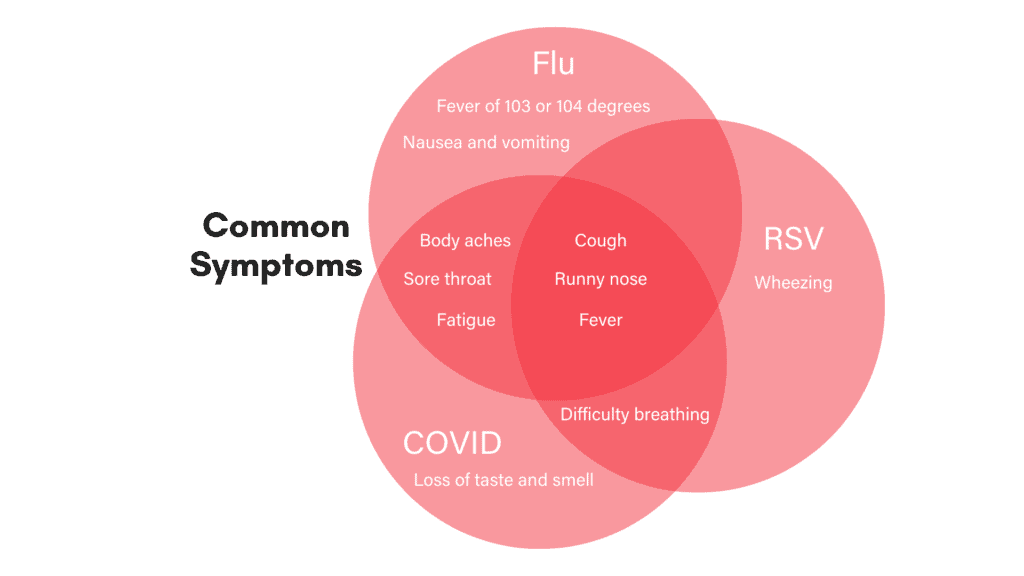As people spend more time indoors during cold and rainy weather, illness spreads faster, and respiratory viruses are more prevalent. According to Texas Department of State Health Services data, over 100,000 people likely had flu/RSV, and 822,474 likely had COVID-19 during the 2022/2023 respiratory illness season.
These months are approaching again, and it’s essential to be prepared and know the signs of flu, COVID-19, and RSV.
Vaccines
Getting your yearly recommended vaccines is the best way for you and your family to prepare for virus season. Vaccines help provide protection from diseases, lessen the severity of illnesses, and help stop the spread of the virus. By helping prevent the worst cases of respiratory viruses, vaccines reduce the number of people needing emergency medical services and help keep our communities healthier.
September and October are the best months to get your vaccines for the most protection. But virus season can continue through May, and outbreaks throughout the year happen, so don’t hesitate to receive your shots even if it’s past the end of October.
Flu
Everyone aged six months and older should get an updated flu vaccine. People 65 and older should get a high-dose or adjuvanted vaccine if available.
COVID-19
The CDC recommended the newest COVID-19 vaccine on September 12, 2023. They urge everyone aged five years and older to get an updated COVID-19 vaccine. Children aged six months to four years should get 1-2 doses of the updated vaccine if they were previously vaccinated or 2-3 doses if they have received no prior COVID-19 vaccines.
RSV
All infants need protection from RSV. They can get it either from an RSV antibody immunization for all children younger than eight months or an RSV vaccine for women 32-36 weeks pregnant. Adults aged 60 and older should talk to their doctor to see if they should get an RSV vaccine.
Symptoms and Testing
Because flu, COVID, and RSV are all respiratory viruses affecting the network of tissues that help you breathe, these three illnesses share many symptoms. Due to the similar symptoms, testing is necessary to differentiate between viruses.
Flu
- Cough
- Runny nose
- High fever (103 degrees and higher)
- Body aches
- Sore throat
- Fatigue
- Nausea and vomiting
COVID-19
- Cough
- Runny nose
- Fever
- Difficulty breathing
- Body aches
- Sore throat
- Fatigue
RSV
- Cough
- Runny nose
- Fever
- Difficulty breathing
- Wheezing
 Medical Care
Medical Care
When you or a loved one starts to feel sick, limiting contact with others is vital to reduce the spread of illness. Getting tested is the next step in managing symptoms and getting on track to feeling better. An at-home rapid COVID test can detect a COVID-19 infection, and a PCR test sent to the lab can confirm COVID-19, flu, or RSV. Early detection of these viruses may allow you to take an antiviral medication, such as Tamiflu or Paxlovid.
Most viral infections can be treated successfully with antivirals, over-the-counter medications like acetaminophen and ibuprofen, and lots of water and rest. As with any respiratory illness, you should call a doctor immediately if you have trouble breathing, experience severe vomiting and diarrhea to the point where you can no longer eat or drink, or if your symptoms aren’t improving or are worsening after five days. All three viruses are potentially more severe in younger and older patients and those with preexisting conditions.
With the strain that flu, COVID-19, and RSV typically put on hospitals and doctors’ offices, having an option like Ally Medical can save you time and provide expert care. Ally Medical operates seven emergency rooms in Texas with Austin-area locations in Bastrop, South and Central Austin, Dripping Springs, Round Rock, and Houston-area locations in Clear Lake and Spring. No appointments are needed; patients may come in any time, day or night, with little to no wait. Each Ally Medical Emergency Room is equipped to treat major and minor medical emergencies for children and adults of all ages in a safe and stress-free setting. If you can’t wait to get in to see your primary care physician or don’t have one, Ally Medical is here to get you feeling better faster.
Resources
https://www.cdc.gov/respiratory-viruses/whats-new/immunization-overview-2023-2024.html
https://www.cdc.gov/coronavirus/2019-ncov/vaccines/stay-up-to-date.html
https://www.dshs.texas.gov/covid-19-coronavirus-disease/texas-covid-19-surveillance



